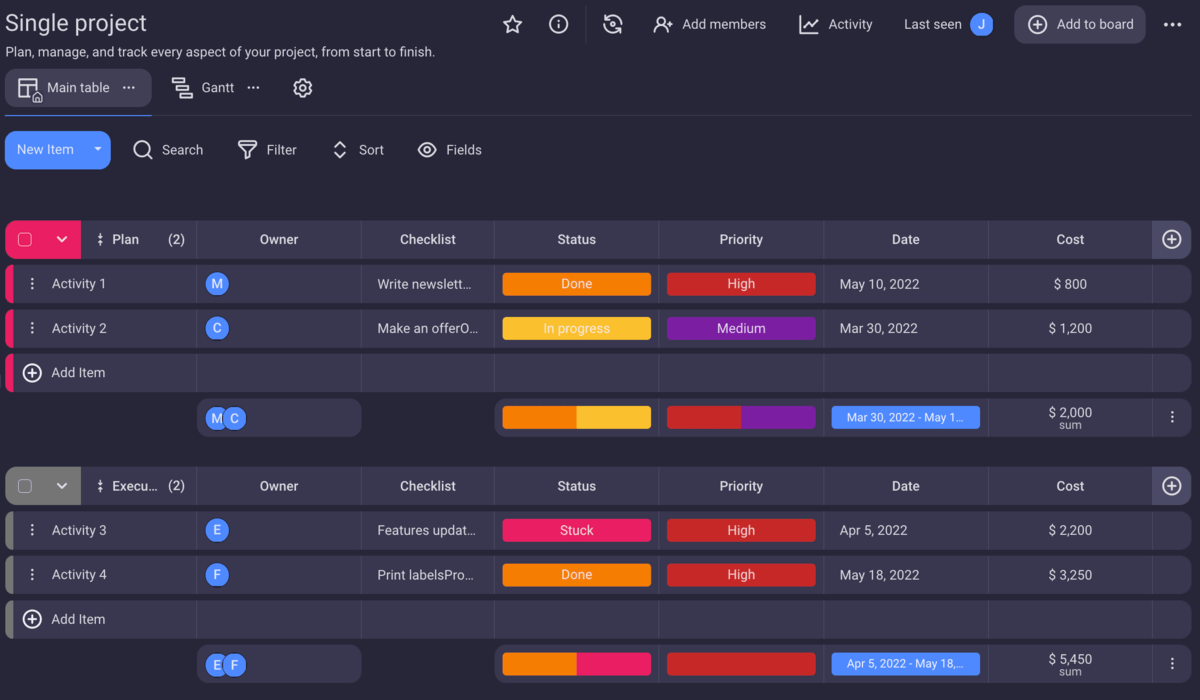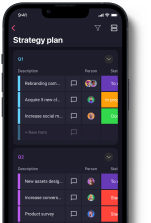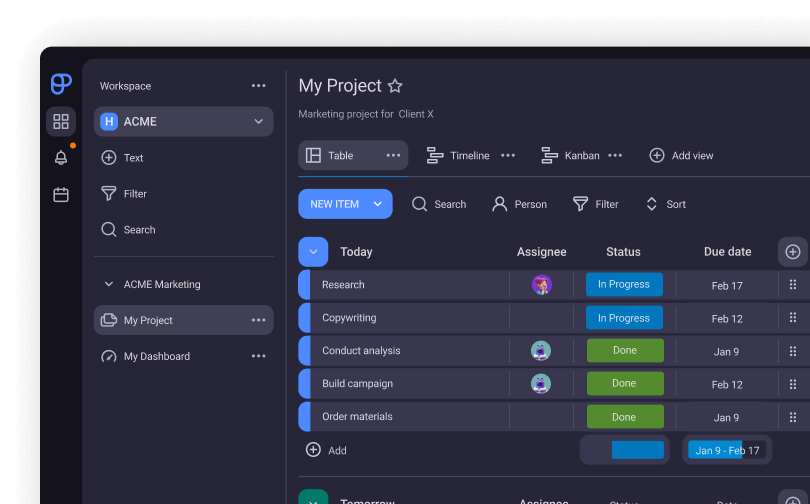What is Project Accounting?
Did you know that, according to the latest project management statistics, poor resource management is the third-ranked reason for project failure?
To avoid going over budget or ending up with an unprofitable project on your hands, you should start taking your project accounting seriously.
With project accounting, you’ll get a clearer picture of where your project is heading financially.
By understanding your project’s financial health, you’ll more easily direct your strategy toward success.
Keep reading as, in this guide, we’ll cover:
- Project accounting definition,
- Differences between project accounting and general financial accounting,
- Project accountant job description,
- Advantages of project accounting,
- Who benefits from project accounting, and
- Real-life tips for project accountants.
So, let’s dive in.

Table of Contents
What is project accounting?
According to Project Accounting Australia, project accounting is “a specialized form of accounting that focuses primarily on project delivery”.
Project accounting includes activities such as:
- Tracking,
- Reporting, and
- Analyzing financial results and implications.
As explained in Project Management Accounting: Budgeting, Tracking, and Reporting Costs and Profitability, project management accounting involves “much more than considering how project income and expense impact the general ledger.”
Project accounting — sometimes referred to as project financial management — among other things encompasses:
- Traditional accounting,
- Cost accounting,
- Budgeting,
- Financing,
- Cash flow management, and
- Earned Value Management.
To sum up, project accounting is a process of recording and analyzing all the financial information in a project.
What’s the difference between project accounting and general financial accounting?
Project accounting and general accounting are similar as they both deal with financial transactions. However, there are some differences between the two.
To address this topic, we’ve reached out to an expert in the project accounting field — Wendy Ha, the Founder, Principal Consultant, and Advisor at AgileCPA.
Wendy is a Chartered Professional Accountant (CPA) and Certified Management Accountant (CMA) with over 10 years of experience as a finance and accounting leader.
In her professional opinion, though some similarities between general and project accountant jobs do exist, there are a couple of differences as well.
Here’s how Wendy defines the general accountants’ role:

“General accountants will:
- Review all the financial transactions of a business and record them in the correct ledger accounts.
- They will then “close the books” periodically and make any necessary period-end journal entries to comply with the accounting standards.
- Finally, they will present the financial statements along with the KPIs (key performance indicators) to stakeholders.”
And, here’s how Wendy defines the project accountants’ role:

“Project accountant‘s role is similar to a corporate accountant, but more on a detailed, project level:
- They will only consider the transactions related to that project, and the key goal is to monitor the project to ensure it is within budget and it is profitable.
- They will mainly present the results to management.”
So, let’s sum up the key differences between project accounting and financial accounting:
Difference #1: Scope
General accounting deals with all financial transactions of the entire business, while project accounting reviews only project-related transactions.
Difference #2: Time-frame
General accounting is done periodically, that is, over defined periods of time (for example, monthly or yearly). Project accounting, on the other hand, relates to shorter time periods or project milestones.
Difference #3: Persons you report to
In general accounting, financial statements are usually presented to stakeholders, while in project accounting, the reports are presented to management.
What does a project accountant do?
To obtain firsthand information about the responsibilities of a project accountant, we once again turn to Wendy Ha.
At one point, Wendy worked in an animation studio where she was responsible for handling 5 projects or animated series.
Here is a list of Wendy’s day-to-day activities as a project accountant at that time:

“The day-to-day activities include:
- Generating client invoices and recording payments,
- Inputting vendor bills and issuing payments to vendors,
- Running payroll (for the production cast and crew),
- Bank reconciliation,
- Preparing financial, variance, and other ad hoc reports,
- Meeting producer/manager to discuss cost spent to date, variances and milestones/deliverables achieved, and projected income for the remainder of the project.”
Wendy personally enjoys the project accountant role because it’s detail-oriented:

“For example, the budget for an animation project will include items that you normally don’t see in typical financial statements. These items include producer/stars/director fees to storyboard/make-artist/wardrobe fees to editing/sound mixing/subtitle fees.”
Wendy also states that having to stay on top of the project is another important aspect of an accountant’s job:

“Project accountants also need to be up to date with the operational side of the projects (i.e. tasks, milestones, deliverables) to track the costs/revenue against the project progress.”
As we can see from Wendy’s example — working on projects as an accountant — apart from the financial activities, you also need to be familiar with basic project management concepts, such as:
- Project tasks,
- Project milestones, or
- Project deliverables.
Why is project accounting important?
It’s said that there are 3 pillars of project management, the so-called, Iron Triangle of Project Management, which includes:
- Project scope,
- Project time, and
- Project cost.
Project cost or project budget is where project accounting fits in, with a focus on the financial management processes.
Managing projects or programs can often be a challenge for project managers and accountants because they often juggle multiple projects coordinately.
To rise to that challenge and reach the desired goals — a successful project delivery — Wendy recommends that project team members should actively communicate with each other and stay up to date with all the ongoing changes:

“It is very important to meet regularly with the producer/manager because the lifespan of the project can be quite short (6-9 months). If there is an overrun in one area, we need to let the producer/manager know as soon as possible so they can make key decisions.”
Wendy further illustrates the importance of staying informed, with an example from when she worked as a project accountant in the animation industry:

“For example, in one animation project, the voice actor budget was around $25K for 10 episodes. After 5 episodes, we’ve paid them $20K already, so there was an issue. We need to make sure the voice actor can record the remaining 5 episodes as quickly as possible. If not, it will go over budget. In order to overcome this, the project accountant has to be up to date (ideally on a weekly, if not, a daily basis) to monitor the income and costs.”
The main benefits of project accounting
Based on the above examples, we can conclude that project accounting plays a vital role in project management, which is why it should be an integral part of it.
To sum up, project accounting is important because it allows you to:
- Monitor incomes and expenses,
- Keep cost and contingencies under control and prevent budget overruns,
- Track project milestones,
- Gain the latest information on the project’s progress,
- Facilitate the decision-making progress with valuable information on the potential issues,
- Help the project team understand the project’s profitability,
- Increase chances of achieving project success, and
- Identify lessons learned for future projects.
Who uses project accounting?
Project accountants and project managers usually work together to achieve a shared goal — a successful project.
But, if the project isn’t profitable, it can hardly be called successful.
With that in mind, all projects that track time or cost against milestones should have a project accountant to monitor them.
As explained in the PMBOK® Guide, Construction Extension, industries that usually benefit the most from project accounting are those with projects that result in a one-of-a-kind deliverable with each new contract.
Here are examples of such industries:
- Construction,
- Engineering,
- IT, and
- Creative industries.
4 Essential tips for project accountants
If you’re still struggling with the basics of project accounting, don’t worry — here are some tips and tricks that will make your project accounting life easier:
- Have project documents at your disposal,
- Be flexible with your plan,
- Use project accounting systems, and
- Learn from practice.
Keep reading, as we’re about to cover these tips in more detail.
Tip #1: Have project documents at your disposal
As explained in Project Management Accounting: Budgeting, Tracking, and Reporting Costs and Profitability, information collection is a crucial element in both project management and accounting.
Correct information and documents facilitate effective decision-making, which is one of the prerequisites for project success.
These are the documents that help you better understand your project’s financial health:
- Project charter,
- Work breakdown structure,
- Project budget and cash flow,
- Resource plan,
- Procurement plan,
- Quality plan,
- Project risk response plan, and
- Project status reports.
Proper documentation provides a clear overview of the project and helps you remain realistic with your objectives.
Our source, Wendy Ha, highlights the importance of fully understanding your project even before the initiation stage:

“It is important for the project accounting manager to fully understand the project and budget prior to the start of the project. Their goal is to ensure that it is reasonable and has some room for contingency (this will minimize risks if the project overruns).”
Tip #2: Be flexible with your plan
Projects rarely go according to the initial plan, especially in an agile environment.
Due to the ever-changing nature of projects, it is essential to remain flexible and quickly adapt to those changes.
To stay in control of your project’s financials — it’s good to have a plan B or even a plan C, if necessary.
Here’s some expert planning advice:

“I typically have at least 3 plans: Base, fair, and worst-case scenarios. This way, if the base case is not going to plan, you already have a backup ‘fair and worst case’ plan.”
Tip #3: Use project accounting systems
According to the PMBOK® Guide, Construction Extension, the project accounting system should “be similar in structure to the work breakdown structure (WBS), showing the breakdown of the total project in more controllable modules.”
The guide also explains that the size of the project determines the accounting system you should opt for:
- In small and medium-sized projects, you can keep the breakdowns on simple spreadsheet-generated S-curves, while
- Large projects require more sophisticated accounting systems.
Wendy Ha chooses the accounting software depending on the project type and its budget:

“This really depends on the industry and the budget. I’ve used Netsuite before, but Quickbooks/Xero can also work (with proper setup). In the film + media space, I’ve used a project Vista or Smart Accounting.”
Also, using a project management tool and an accounting system simultaneously facilitates understanding the project completely.
Project management software helps you keep track of all project activities and thus stay up to date with the changes.
Here’s what managing a project looks like in Plaky, a project management tool:

As you can see in the example, with a project management app, you can easily access project information at any time, e.g.:
- Task statuses,
- Task priorities,
- Task deadlines,
- Task costs, etc.
The access to real-time information facilitates tracking costs and revenues and comparing them with how the project’s progressing.
Tip #4: Learn from practice
Along with courses and books, learning from practical project experience is essential for becoming a successful accountant.
For that matter, you should embark on your first project as soon as possible.
Wendy Ha shared with us her journey toward becoming an expert in the project accounting field:

“I learned a lot of project accounting concepts back at university and when I was getting my CPA designation. I also read some books/articles to further increase my knowledge of project management (i.e. Project Management for Dummies). Most importantly, I developed most of my skill set through real-life projects and believe this is the most valuable learning experience.”
So the most valuable tip is to keep educating yourself about project management and gaining practical knowledge.
💡 Plaky Pro Tip:
If you’re looking for more project management book recommendations, check out this guide:
Conclusion: Project management and project accounting are tightly related, and together they lead to project success.
In this guide, we have covered the basics of project accounting and given you some real-life expert advice on the topic.
Also, we have concluded that project accounting is tightly related to project management and that they can hardly function separately.
Due to this strong correlation, project accountants should clearly understand key project management concepts to do their job successfully.
After all, project accounting provides crucial feedback on your finances, further affecting all important project-related decisions.
Let’s wrap up with this quote explaining the importance of resources: “the strategy of a company must be driven by financials; whatever the company’s mission is, without sound financials, the company cannot succeed” (Callahan et al., 2011).
📖 Project accounting or project financial management is directly related to the management of the budget constraint. To learn more about all the different types of project constraints, who manages them, and how, explore our Project Management Glossary of Terms where you’ll find a range of project management terminology every project manager should be familiar with, from basic to highly advanced.
References
- Callahan, K. R., Stetz, G. S., & Brooks, L. M. (2011). Project Management Accounting: Budgeting, Tracking, and Reporting Costs and Profitability. John Wiley & Sons.
- Gofman, D. (2020, April 27). What is Project Accounting? Project Accounting Australia. Retrieved January 12, 2023, from https://projectaccounting.com.au/what-is-project-accounting
- Project Management Institute. (2021). The standard for Project Management: A guide to the Project Management Body of Knowledge (PMBOK® Guide).
- Project Management Institute. (2016). Construction Extension to the PMBOK® Guide.
- Villanovau.com. (n.d.). Retrieved January 17, 2023, from https://www.villanovau.com/resources/project-management/iron-triangle-project-management/
 Project Management Hub
Project Management Hub 











